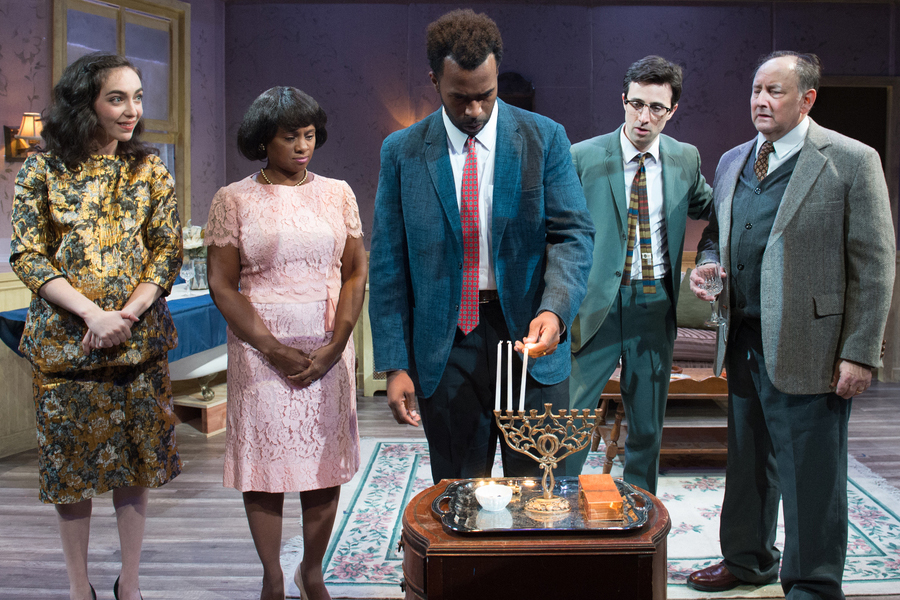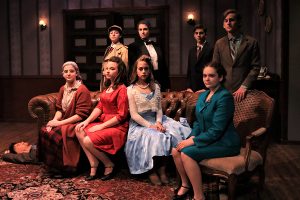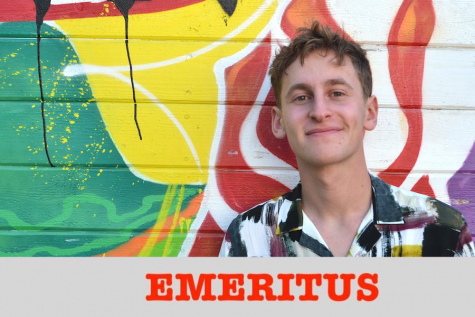New play explores trauma’s impact across generations and cultures
Acclaimed play ‘Eight nights,’ directed by Ms. Chase, starts with the Holocaust and reaches far beyond it
DIFFERENT: Three decades after Rebecca arrives in the US, her friends and family from different backgrounds gather to light the menorah on the third night of Hanukkah in ‘Eight Nights,’ at the Antaeus Theater last month.
January 8, 2020
The Holocaust is arguably the most common subject and setting of Jewish art. Eight Nights, written by Jennifer Maisel and directed by Shalhevet’s own theater teacher Ms. Emily Chase, is firmly a play which deals with the subject of the Holocaust, but is it not merely another piece of Jewish Holocaust art.
The new play, which ran from Oct. 31 to Dec. 16 to rave reviews at the Antaeus Theatre Company in Glendale, does not restrict itself to first-generation Holocaust survivors, or even the Holocaust itself. Instead it examines the fallout caused by tragedy, as it is experienced across generations and not in Jewish culture alone.
Eight Nights follows a woman named Rebecca, a passenger on the MS St. Louis and eventually a Holocaust survivor, through 80 years of her life in America, at 10-year intervals each of which is represented by one of the eight nights of Hanukkah.
Rebecca’s family members who have died, including her father and husband, remain on stage as ghost-like figures, communicating with her in silence throughout the play.
In the premiere production, Zoe Yale played Rebecca through the first 30 years of the story; Tessa Auberjonois played the ghostlike figure of her mother, Anna, during this period. Younger Rebbecca looks out across the stage to her mother during moments of doubt, yet cannot receive a response.
In one of the play’s most important moments, between nights three and four, Ms. Yale as Rebecca embraces her mother, played by Ms. Auberjonois who then plays Rebecca for the rest of the play. This moment of embrace and Ms. Auberjonois’s transition symbolize Rebecca taking all that she’s learned from her mother into her own role of raising a family — moments when her mother taught her how to grow up as well as the trauma of having been in a concentration camp with her.
Later in the production, Ms. Yale played Rebecca’s daughter and granddaughter. None of this was done to keep the cast small — seven actors in all. Rather, having the same actors play multiple roles connects those characters, which becomes increasingly important in a play about the trauma playing out across time.
Nor does the play look only at the Holocaust. A thread woven through it is the question of whether the Holocaust can be compared to other instances of ethnic or racial oppression. Recently this question has gained relevance when Republican Congress members took offense to using the term “concentration camps” to describe detention centers where asylum seekers have been held by the U.S. Immigration and Customs Enforcement (ICE). While the play does not give a clear answer to this question, it seems to suggest — through Rebecca’s relationships with others — that making Holocaust comparisons for the sake of drawing attention to current atrocities is more important than holding it seperate from anything that has or is happening.
For example, Rebecca’s acquaintances over the years include the descendants of those held at U.S. Japanese internment camps and enslaved African-Americans, as well as a Syrian refugee. At first, Rebecca forcefully exclaims that internment camps are “not the same” as the Holocaust. Later in the play, she begins speaking to students about her experiences in the Holocaust, hoping to teach them. By the play’s end, she accepts Joram, the Syrian refugees, into her home. Rebecca shows him her branded number from Auschwitz, telling him that they share a trauma that only they can understand.
The most challenging moment of the play is when Nina, Rebecca’s granddaughter, shows Rebecca a tattoo she got that matches her grandmother’s branded number. This scene reflects an actual trend among Holocaust descendants.
Rebecca is instantly outraged that Nina would choose to emulate something which caused she herself so much pain.
Yet for Nina, her tattoo is a symbol of the role that the Holocaust has played in her own life. Even for Jews who are third- or fourth-generation survivors, the Holocaust plays a central role in Jewish education and identity. So too has it greatly defined the last 70 years of Jewish culture.
Rebecca and Nina’s argument, the climax of the play, is representative of a larger question asked to the Jewish world: do we owe it to the 6 million to define our lives by the Holocaust, hoping to prevent a similar crime from ever happening again but also reliving the pain and suffering of one of history’s greatest tragedies?
And if we do not use our extensive knowledge of the Holocaust and the events preceding it to identify and advocate against real genocides that are happening around the world, is there even a point to Holocaust education at all?
The character of Rebecca embodies the play’s narrative contradiction. She understands the need to prevent against future genocides while still wishing that her daughter and granddaughter could grow up out of the shadow of the Holocaust. Eight Nights does not offer clear conclusions. It leaves an audience questioning their own beliefs.
The portrayal of conflicting desires within Rebecca and her journey through life and people make this Jewish play something more important than one more examination of the Holocaust. Instead, it uses a defining cultural moment for Jews as a way to create bridges with other oppressed groups, to better understand their experience as well as to help fight against similar atrocities still ongoing.
Eight Nights is no longer showing at the Antaeus Theatre Company. But from my own experience and those of everyone I have talked to that has seen it, the drama is a perspective-altering production: one that I thoroughly hope returns to the stage so that anyone, be they Jewish or not, can grapple with its powerful message.
















